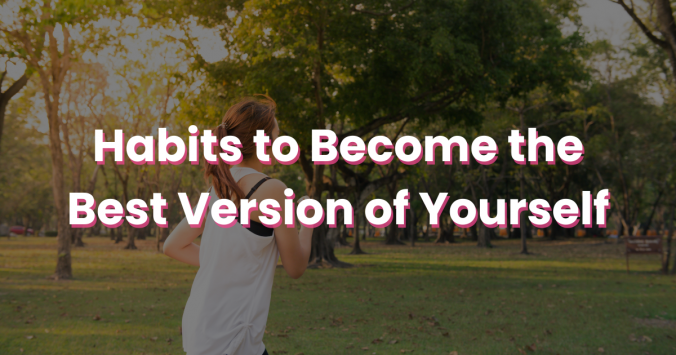I’ve been asked more and more to share my insights on developing habits with various organizations since the start of the pandemic. Many have found themselves with extra time with their commutes removed from their day. Some are choosing to feel that extra time with habits like exercise, reading, meditation, and a multitude of other activities. Some are successful at turning them into habits. Many or not. I share my insights as to why.
Why are habits important in the first place?
For anyone who has ever tried to start a new routine, oftentimes an act of sheer willpower is needed to get started. That willpower often drains energy and you don’t want to be using that much energy every time you do something. Habits can help you reduce that energy train so you can use that energy for other things.
Parts of a habit
Habits can be sliced and diced into various segments. I like to use Charles Duhigg’s version.
- Cue: A trigger that signals the habit to start
- Action: The activity of the habit itself
- Reward: A reinforcement for the behaviour
Habits don’t always form when you start doing things primarily because without the cue or the reward, The habit has nothing to anchor itself to in your brain.
Getting rid of a habit or starting a new habit
One of the most surefire ways to get rid of a habit is to remove all cues for that habit. Unfortunately that is easier said than done if you cannot completely control your environment.
Consider the FOGG behavioural model. Think of one vertical axis for Motivation and a horizontal axis for Ability. There would be an action line that starts from high Motivation and low Ability and curves down and flattens towards low Motivation and high Ability. When something is above the line then it occurs and happens. When something is “below” the line then it does not occur or happen.
That means to get rid of a habit you need to decrease your motivation or decrease your ability.
You can decrease your motivation by pairing your habit with a consequence.
- Want to stop snoozing and sleeping in? Set an embarrassing social media post to go out just after your alarm wakes you up. You better get up, or that post will tell the world about your embarrassing moment!
You can decrease your ability by making your habit more difficult to do.
- Want to stop snacking on some junk food? Stash it way towards the back of your cupboard where you have to inconveniently take out other items to get to it.
- Want to stop spending so much? Put your credit card in a hard to access spot. Or even freeze it in a block of ice so that you literally have to melt it to access it – Hopefully by the time you get your credit card out, your impulse to buy has subsided. Make sure you also delete any saved credit cards on your browser for online sites.
On the other hand, if you want to start a habit, you need to increase your motivation or increase your ability. You can increase your
You can increase your motivation by finding the core purpose for wanting to set up the habit or finding a partner to hold you accountable for your actions.
- To find your core purpose or why for the habit, ask yourself: why is that habit important to you? With whatever answer you provide, ask yourself: why is that important to you? Repeat that five more times. If you don’t repeat yourself and really focus on it’s important to you then you’ll often find the core reason
- An accountability partner can help many stay on task. That’s why study buddies, gym buddies and other type of accountability partners can’t be so helpful
NOTE: for most people one or the other works better. Take a look at when you’ve been successful in starting a habit in the past and repeat your success.
To increase your ability, understand your tendencies.
The acronym SPACEBEAR can help you to find some of your tendencies.
- Step-type: Do you prefer small steps, or do you “go big or go home”?
- Pace-type: Are you a marathoner (consistently spend time to move towards your goal), sprinter (hit things hard, then take a break then hard and break), procrastinator (wait until the last minute before you get something done)
- Aversion-type: Do you react better to a “carrot”, or a “stick”?
- Chrono-type: Are you a Lion (get stuff done early in the morning often before anybody else is awake), Bear (slower to rise and get stuff done in the middle of the day), or Wolf (our most productive late night)
- Expectations-type: Are you an Obliger (need someone to help hold them accountable) or a Questioner (need to know why something is important to them)
- Buying-type: Are you an Under-buyer (buy just enough or wait until you’re almost out), or an over-buyer (buy so much that you’ll never run out and always have some in reserve)
- End-type: Are you a Finisher (like to check things off your to-do list), or an opener (like to start new things – though not necessarily finish them)
- Availability-type: do you prefer simplicity, or abundance
- Recognition-type: do you prefer familiarity, or novelty?
Knowing your tendencies can do wonders to get that habit going. For example: you might start a habit like exercise and only continue it if you constantly find new and novel parts of it to do. Or you might need to start with familiar and easy to do exercises before you gradually move on two more difficult exercises.
Summary
Wow there are many more ways and considerations to effectively start or stop a habit, these will hopefully be some useful tips to get you started.
By setting up habits, you might find that you have more energy to do other things throughout the day.
Pick something from the above to implement. Try it out for a few days or weeks. If it sticks then keep it. If it doesn’t, then try something new.
You’ll likely find that when you set up these habits you become even more productive in your work and life.
About Luki
Luki is a career coach and likes to say that he has found his purpose helping others find theirs. A former management consultant and campus recruiting lead, he shares his SIWIKE Stuff I Wish I Knew Earlier through books, podcasts, videos and other content. Connect with him on LinkedIn https://www.linkedin.com/in/lukidanu/ or Subscribe on YouTube to access other content https://youtube.com/focusinspired



